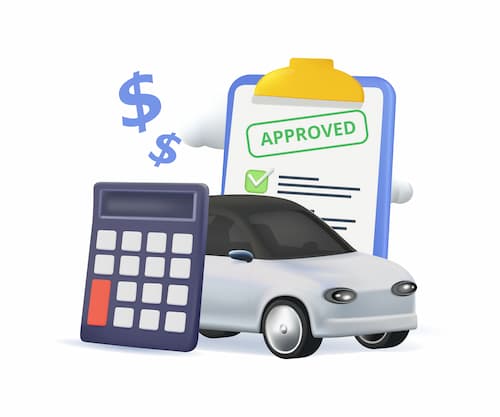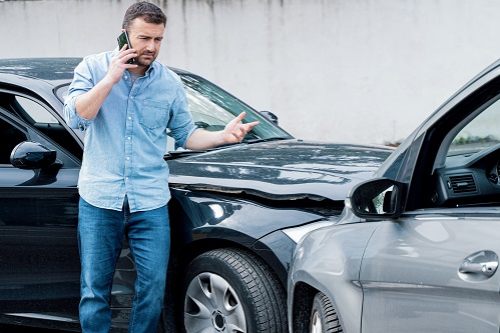How do police prove texting while driving?
Police are on the lookout for signs of distracted driving. Here are five ways the police know when your eyes are on your phone rather than the road.
They see the phone in your hand
Don't assume your tinted windows are going to hide your phone or that you’re holding it at an angle that can’t be seen. Officers know how to spot a phone in your hand and will pull you over if they see it.
An officer patrolling on a motorcycle can stop next to you and get a clear view into the driver’s compartment. It’s pretty easy to see whether or not you’re using your phone in that situation. And you might not notice them until they’re right next to you.
You are constantly looking down
Are you being sneaky by keeping your phone on your lap or a center console? Constantly looking down and to the side, especially if you have only one hand on the steering wheel, can be a dead giveaway.
In certain states, officers need to see the phone before pulling someone over for texting and driving, but that doesn't mean you can't be pulled over for other things. If you appear distracted with your eyes moving off of the road, you can be pulled over.
Most states with anti-texting legislation do allow officers to pull over a driver for a texting offense alone.
The glow from your screen gives you away at night
The soft glow from your screen makes it possible to type at night; it also makes it possible for police to see who is using a cell phone in the car. The blue-toned light that emanates from your phone looks a lot different than that of your car’s interior lights. A passing officer can easily tell the difference and can even see it from a distance, and it could result in a ticket.
Officers see you weaving, and your speed fluctuates
A good sign you’re distracted is weaving in your lane or repeated fluctuations in speed as you take your eyes off the road to read or send a text. Even if the officer doesn’t see the phone, this sort of erratic driving will catch their attention.
If they don’t actually see the phone, erratic driving is dangerous and could earn you a ticket either way.
The police are watching you from above
Police departments in some states are upping their game, literally. The U.S. Department of Transportation issued grants in 2012 to Connecticut and Massachusetts to help them develop new ways of cracking down on texting and driving. Those methods include setting up spotters on overpasses to look for texting drivers and notify nearby patrol cars.
In 2016, GEICO invested $1.3 million in New York to set up and encourage text stops on roads in New York. And in 2022, the Governors Highway Safety Association partnered with General Motors to dole out $220,000 in grants across seven states designed to help reduce distracted driving.
What happens when you get caught texting and driving?
Penalties for texting and driving vary by state. Michigan cellphone tickets come with a $100 fine and two points on your license for a first-time offense. Other states may also have fines and/or points attached to violations.
If your state considers texting while driving to be a moving violation, it could be seen by your insurer as a minor infraction. Some insurers disregard a minor violation when it comes to policy renewal but may discontinue any good driver discount you previously enjoyed. Other insurers may raise your rates with only one ticket on your record, and multiple infractions almost always result in a rate hike.
In some states, texting tickets aren't counted as moving violations, but other states, including Arizona, consider texting and driving to be a moving violation. "All violations fall into one of two categories: minor violations and major violations," explains Charlotte Burr, co-owner of AZ Insurance Team in Tempe, Arizona. Most insurance companies consider cellphone tickets a minor violation, but that doesn't mean they don't come without a price. "If someone has a minor violation, it may raise their premiums a little -- maybe 10 to 20%."
Texting while driving may also be the basis for more serious charges, such as careless driving or reckless endangerment, if it leads to an accident. Those can be major violations, racking up more points and higher auto insurance premiums.
Beyond the cost of getting caught is the risk of causing an accident that could be fatal. Even if you think you can get away with it, texting while driving is simply not worth the risk.
Read more to know how violations affect your car insurance rates.
Sources
- FindLaw. New Jersey motor vehicles and traffic regulations. Accessed May 2024.
Frequently asked questions
What is the NJ cell phone law?
The New Jersey cell phone law prohibits drivers from using a handheld cell phone or other electronic devices while driving. Here are the key points:
- No handheld devices. Drivers cannot use handheld cell phones or other electronic communication devices while driving.
- Hands-free only. Drivers are allowed to use hands-free devices, such as Bluetooth, but only if it doesn't interfere with the safe operation of the vehicle.
- Texting ban. Texting while driving is strictly prohibited.



